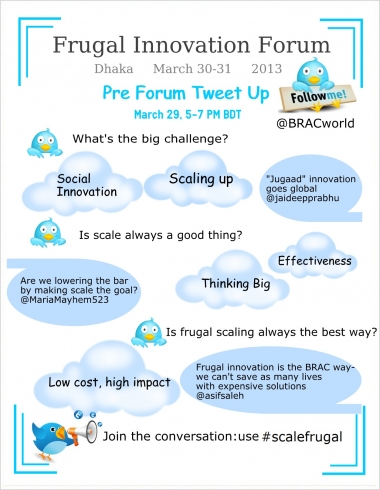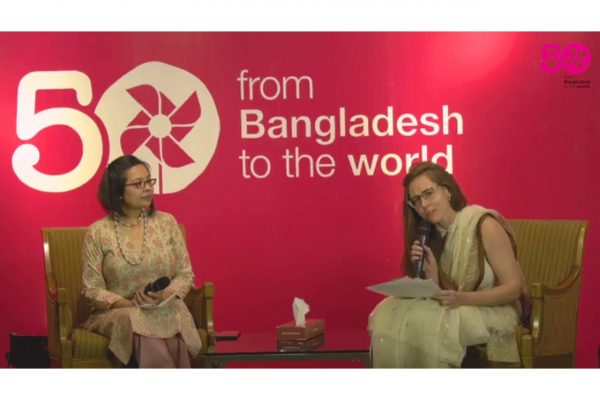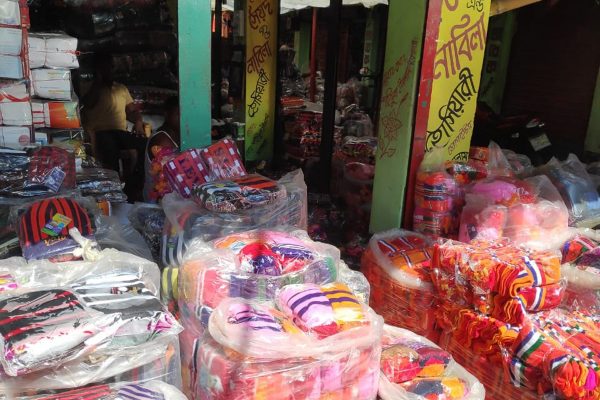Questioning the unquestionable: are innovation and scale good things? On twitter this week
Reading Time: 2 minutes
It may surprise you to learn that BRAC’s Social Innovation Lab team is actually incredibly sceptical about the importance of innovation. More than once, my colleagues have asked if we could change our name to something that didn’t put innovation up on a pedestal. “Social Innovation, Improvisation, and Improvement Lab” just doesn’t have the same ring to it, unfortunately. From my perspective, this questioning is important—it keeps us grounded in terms of the limitations of the tools we can offer to the problems posed to us.
It may surprise you to learn that BRAC’s Social Innovation Lab team is actually incredibly sceptical about the importance of innovation. More than once, my colleagues have asked if we could change our name to something that didn’t put innovation up on a pedestal. “Social Innovation, Improvisation, and Improvement Lab” just doesn’t have the same ring to it, unfortunately. From my perspective, this questioning is important—it keeps us grounded in terms of the limitations of the tools we can offer to the problems posed to us.
These sentiments are supported by the insightful paper by Professors Christian Seelos and Johanna Mair published last fall with the punchy title, Innovation is not the Holy Grail. One of their points is in fact, that overvaluing innovation can be detrimental for a social sector organization because other important goals, such as routine improvements and operational efficiency, may be relatively undervalued. And innovation requires time and money, which could be allocated for other purposes, such as scaling up. Which allocation will lead an organization to have more impact?
Seelos and Mair will join us at the upcoming Frugal Innovation Forum: Scaling Simple Solutions on March 30-31, which will highlight organizations that have widespread impact. While identifying lessons from past experiences, clearly much of the event will focus on the future: what’s next? With the buzz about the myriad “innovations” in the pipeline, surely there are ways to alleviate poverty faster, more effectively.
I’m pleased to see that Mr. Madhav Chavan of Pratham, one of the event’s featured speakers, has already published a thoughtful piece with his thoughts on how to avoid the Holy Grail phenomenon for IT innovations in education. He writes:
Abraham Maslow, the American psychologist, is quoted saying, “If all you have is a hammer, everything looks like a nail.” As quotes and proverbs go, this one can be used within many contexts. But, allow me to use it within the context of IT with some care. While IT has been much discussed and will doubtless be a major player in transforming education over the next several decades, I feel that we need to decide if we are looking at a nail or something else entirely……to my previous point about the hammer and nail, my experience has only confirmed my belief that problems that appear complex often require simple — but certainly not uniform — solutions.
Chavan is clearly seeing danger signs of the overscaling of “solutions,” from one context, in which they are effective, to others, where they are not. This is the darker side of scale, that impact does not have a simple linear relationship with the size or reach of an intervention. How do we know when and what to scale?
We will be getting deep into these questions during our event, but we’d like to welcome thoughts and questions from around the world to jumpstart the conversations. Tweet your thoughts on: Do we need more social innovation, or is the big challenge these days just to scale up what we know? Is scale always a good thing? What’s the downside of scaling up? Is frugal scaling always the best way?
Join the conversation at #scalefrugal on twitter. On Friday March 29, from 5-7PM BDT (11AM-1PM GMT, 7-9AM EST), we’ll have several experts, including Johanna Mair, Christian Seelos, and Madhav Chavan, participating live. Follow @BRACworld to learn more and get the highlights throughout the Frugal Innovation Forum.






